C O N F I D E N T I A L SECTION 01 OF 03 MOSCOW 000241 SIPDIS E.O. 12958: DECL: 01/28/2020 TAGS: PREL, PGOV, PHUM, SOCI, RS SUBJECT: HILARION ON THE ROC'S ROLE IN RUSSIA'S DEVELOPMENT REF: 09 MOSCOW 2842 Classified By: Ambassador John R. Beyrle for reason 1.4 (d)
1. (с) Анотація. 28 січня в бесіді з послом архиєпископ Іларіон визнав, що Російська православна церква (РПЦ) розширює свою присутність у всіх областях суспільства. Недавно церква взяла більш конфронтаційний тон відносно доповіді державного департаменту США про Свободу Віросповідання в Країнах Світу (СВКС). Іларіон захищав позицію РПЦ відносно інших, нетрадиційних релігій. Також Іларіон пояснив бажання РПЦ підтримати поточну державну політику, включаючи «керовану демократію». Не дивлячись на перебільшену самовпевненість РПЦ, Іларіон визнав прірву, яка існує між вченням церкви і життям більшості російських людей, особливо молоді, і задавався питанням, як РПЦ могла б вирішити цю проблему. Не дивлячись на дану прірву, підсумував Іларіон, багато росіян жадають духовного керівництва, і РПЦ має намір заповнити цей пробіл. Кінець анотації.
2. (с) 28 січня в бесіді з послом глава відділу зовнішніх церковних зв'язків РПЦ архиєпископ Іларіон розкрив сучасне становище в РПЦ і її впливі на російське суспільство і політику. Поперемінно то щирий, то обережний, Іларіон визнав, що РПЦ збільшує кількість публічних заяв в своїх інтересах, розширюючи вплив, перш за все в світські області суспільства, такі, наприклад, як дитяча освіта. Називаючи РПЦ «важливою діючою особою» в житті країни, Іларіон зазначив, що патріарх Кирило не просто «символічний глава», але може чинити вплив на основні події в Росії, включаючи політичні.
«Церковна дипломатія» кидає виклик СВКС
3. (с) РПЦ часто іменується «державою в державі», будучи більш політичною одиницею, ніж богословською. Також, як вважає Іларіон, РПЦ відіграє важливу роль і в стосунках Росії з іншими країнами. Ось чому Іларіон вважає важливою свою зустріч з президентом Обамою під час його візиту до Москви в липні 2009 року.
Іларіон висловив свою підтримку послові в світлі недавнього поліпшення американо-російських стосунків, кажучи, що «тепер хороший час, щоб працювати американським послом в Росії», і додаючи, що РПЦ буде щаслива забезпечити двосторонні стосунки на найвищому рівні. (Замітка: лідери РПЦ часто беруть участь в «церковній дипломатії» в ближньому зарубіжжі, підсилюючи зв'язки з православними церквами в Україні і Грузії, уряди яких за останні шість років знаходилися в напружених стосунках з Росією. Кінець замітки.)
4. (с) Не дивлячись на ці покращення, в листопаді РПЦ зробила конфронтаційні заяви відносно щорічної доповіді державного департаменту США про Свободу Віросповідання в Країнах Світу (СВКС), опублікованому в жовтні. Іларіон написав послові листа, опублікованого на сайті відділу зовнішніх церковних зв'язків РПЦ, в якому він скаржився на підтримку Америкою «екстремістів і сатаністів». Негативний тон послання (а також нахабна манера, в якій воно було представлене) різко контрастує з суспільним вихвалянням РПЦ як «об'єктивної» і такої, що прагне заохочувати толерантність відносно інших віросповідань в Росії.
5 (с) Іларіон захищав суть листа, кажучи, що в будь-якому разі «ми задоволені загальною динамікою» і «кожна доповідь краща від попередньої», «існують деякі проблеми, на які слід подивитися уважніше». «Якщо ми подивимося на релігійні свободи американським поглядом, - пояснив він, - доповідь неминуче буде недосконала, тому що не братиме до уваги особливості історичного і культурного розвитку Росії. Ми не хочемо дискримінації, але відмінність між традиційними і нетрадиційними релігіями вирушає корінням в наше далеке минуле». (Замітка: що стосується манери, в якій лист був опублікований на сайті РПЦ, Іларіон сказав, що «повідомлення було таким самим загальнодоступним», але переклав відповідальність на свого попередника, який ввів подібну практику. Кінець замітки.)
Іларіон додав (швидше нещиро), що немає жодного закону, що ставить традиційні релігії вище нетрадиційних, але його обличчя виражало явно зворотне – Закон про релігії 1997 року додає статус «традиційних» чотирьом релігіям (православ'я, юдаїзм, іслам і буддизм). Це ігнорує ключове питання про реалізацію закону, практично маргіналізуючи нетрадиційні групи віруючих. Немов підкреслюючи свою думку, Іларіон сказав, що «деякі кола» всередині РПЦ можуть виражати нетерпиміші погляди і є межі, за якою лідери церкви не можуть їм перешкодити.
«Керована демократія» – просто прекрасно для РПЦ.
6. (с) Позитивнішої оцінки посла заслужила здатність РПЦ до відновлення морального авторитету і побудови власного відомства менш ніж за двадцять років. Погоджуючись з даним питанням, Іларіон зазначив, що РПЦ повинна залікувати рани не лише за останні двадцять років, але і за останні дев'яносто років, з самої Революції.
«Більшість наших проблем сьогодні вирушають корінням в радянський період, – сказав архиєпископ, – включаючи корупцію і лицемірство». Іларіон надає особливе значення необхідності терпеливості в розвитку Росії – пункт, який ми чули вже багато разів від російських співрозмовників (як представників уряду, так і інших). Він виходить з того, що Росія мала всього двадцять років на побудову демократії, тоді як країни на зразок США і Великобританії будували свої суспільства цілі століття.
Також Іларіон сказав, що «наша демократія не повинна копіювати американську», а зважаючи на культуру і історію Росії, це, швидше, має бути форма «керованої демократії».
7 (с) Немов цитуючи план «Єдиної Росії», Іларіон плутає авторитаризм із стабільністю, зазначаючи, що «російським людям завжди подобалося мати стабільну і сильну фігуру вгорі», критикує експерименти з демократією середини 90-х, називає вибори 1996 року «катастрофою», при яких країна виявилася паралізована непривабливим вибором між Єльциним, Зюгановим і Жириновським. Відносно того, чи може Росія прагнути в майбутньому до такого порядку, де люди примушують власний уряд бути відповідальним за політику, Іларіон сказав, що це «теоретично можливо, але на практиці ніколи не працює».
8. (с) Іларіон пояснив, що бачить головну роль РПЦ в пропаганді офіційної політики уряду. Не дивлячись на твердження, що РПЦ не володіє особливим статусом серед релігій, Іларіон заявляє, що патріарх не лише глава православної церкви в Росії, але і «духовний лідер всієї нації».
Він нагадав, як четвертого листопада, в день народної єдності, патріарх відслужив божественну літургію на Червоній площі, а потім очолив процесію, в якій його супроводжували лідери іншої віри. Також РПЦ перша серед останніх розглядається для включення в програму шкільного навчання в 19 регіонах країни. (Замітка: у цій програмі в учнів буде вибір між вивченням однієї з чотирьох традиційних релігій чи курсу «світської етики». Курси релігій акцентуватимуться залежно від національної більшості конкретного регіону. Кінець замітки.) Іларіон підкреслив, що це всього лише «пілотна програма», але мало надії, що офіційна влада вирішать відмовитись від програми у стадії реалізації. У зв'язку з цим Іларіон додав, що «оцінка» ефективності програми відбудеться через деякий час після її запуску навесні.
Довга дорога в соціальну сферу.
9. (с) Хоча РПЦ досягла багато чого у сфері соціального і політичного лідерства, залишається істотний пробіл між її вченням і сучасною російською культурою. Уряд не бачить проблеми в руйнуванні стін між церквою і державою, але це, здається, наводить до перекосу ролі РПЦ від соціальної до політичної. Іларіон з гіркотою визнав, що хоч 70–80 відсотків росіян називають себе православними, мала частина (близько 5 відсотків) регулярно ходить до церкви, а ще менший відсоток громадян «живе згідно заповітів православ'я».
«Дилема церкви, – як пояснив архиєпископ, – полягає в побудові моста між нею і молоддю, яка не бачить ролі церкви в своєму житті, але в той же час в збереженні оригінального єства церковного вчення. Ми не повинні оновлювати або модернізувати служби, але повинні здолати культурні і психологічні бар'єри, що відділяють релігійне і світське життя в Росії». На його думку, кращою формою для досягнення цієї мети є освіта, Іларіон пропонує усесторонню програму, яка підвищила б інформованість, але не здавалася агресивною.
Коментар.
10. (с) За відсутності широкої активності серед більшості людей (принаймні в їх щоденних діях) РПЦ, поза сумнівом, намагається перенести свою вагу в політику.
Для тих з нас, хто навчений спостерігати вогненну стіну між церквою і державою, впевнене зростання РПЦ і відкриті визнання, що вони збираються проникнути у всі аспекти російського суспільства, – факти, що не можуть не викликати тривоги.
У той же час Іларіон правильно підкреслює, що Росія пройшла через катастрофічні зміни за останні двадцять років і десятиліття морального банкротства при комунізмі. Серед населення в цілому широко поширено відчуття відрази до надлишків олігархів і «нових росіян», які придбали величезні багатства під час розпродажу державних активів в 90-х роках (і нафтового буму правління Путіна). Відчуття людей, що вони оточені пустими цінностями і цинізмом, привело до відповідного духовного голоду.
РПЦ прагне заповнити цю порожнечу, і ми маємо бути готові не закривати на це очі, але в той же час чітко дати зрозуміти нашу думку, що християнські цінності повинні застосовуватися і до неправославних віруючих.
C O N F I D E N T I A L SECTION 01 OF 03 MOSCOW 000241 SIPDIS E.O. 12958: DECL: 01/28/2020 TAGS: PREL, PGOV, PHUM, SOCI, RS SUBJECT: HILARION ON THE ROC'S ROLE IN RUSSIA'S DEVELOPMENT REF: 09 MOSCOW 2842 Classified By: Ambassador John R. Beyrle for reason 1.4 (d)
1. (C) Summary: In a January 28 conversation with the Ambassador, Archbishop Hilarion freely admitted that the Russian Orthodox Church (ROC) has been extending its reach further into all areas of society. The Church has recently adopted a more confrontational tone regarding the State Department's International Religious Freedom Report (IRF), and Hilarion defended the ROC's stance against some non-traditional religions. Hilarion also explained the ROC's desire to promote current GOR policies, including "managed democracy." Despite the ROC's increased assertiveness, Hilarion acknowledged a gap between the Church's teachings and the daily lives of most Russians, especially youth, and wondered aloud how the ROC might address this problem. Despite this gap, Hilarion concluded, many Russians hunger for spiritual guidance, and the ROC intends to fill that gap. End Summary.
2. (C) In a January 28 conversation with the Ambassador, Head of the ROC's External Relations Division Archbishop Hilarion made the case for the Russian Orthodox Church's (ROC) recent push to assert its influence over Russian society and politics. By turns candid and circumspect, Hilarion freely admitted that the ROC has been ramping up its public statements in favor of its interests, and has been extending its reach further into heretofore secular areas of society such as children's education. Calling the ROC "a significant actor" in the life of the country, Hilarion said that Patriarch Kirill is "not only symbolic," but can also influence major currents in Russia, including its political development.
"Church diplomacy" takes on the IRF
3. (C) The ROC has been referred to as "a government within a government," a political entity as much as a theological one (reftel). As such, in Hilarion's view, the ROC has a role to play in Russia's relations with other countries, which is why Kirill considered it important to meet President Obama during his July, 2009 visit to Moscow. Hilarion echoed the Ambassador's support of the recent warming trend in U.S.-Russian relations, saying that "now is a good time to be an American Ambassador in Russia," and adding that the ROC is happy to lend its assistance in bringing bilateral relations to an even higher level. (Note: ROC leaders also frequently engage in "Church diplomacy" in the near abroad, strengthening ties with Orthodox Churches in countries, such as Ukraine or Georgia, whose governments in the past six years have had tense relations with the GOR. End note.)
4. (C) Notwithstanding these improved relations, the ROC in November struck a confrontational tone regarding the State Department's annual International Religious Freedom Report (IRF), released in October. Hilarion penned a letter to the Ambassador -- posted on the website of the ROC's external relations division -- in which he complained of perceived U.S. support for "extremists and Satanists." The negative tone of the letter (as well as the somewhat brazen manner in which it was presented) contrasted sharply with the ROC's initial public praise of the report's "objectivity" in observing that the ROC has attempted to promote interfaith tolerance in Russia.
5. (C) Hilarion defended the substance of the letter, saying that although "we are satisfied with the general dynamic," and "each report is better than the one before," there are still some issues that "need to be looked at carefully." If we look at religious freedom exclusively through American eyes, he explained, then the report will inevitably be imperfect, because it will not sufficiently take into account the individual historical and cultural development of Russia. "We don't want to discriminate," he said, but the distinction between traditional and non-traditional religions is "rooted in our history." (Note: As for the manner in which the letter was made public via the ROC website, Hilarion said that "the report was public, as well," but otherwise passed the buck to his predecessor, who he claimed had established the practice. End note.) Hilarion added (rather disingenuously) that there is no law favoring traditional religions over non-traditional ones, a statement that was not true on its face -- the 1997 Law on Religions elevates the status of the four "traditional" religions (Orthodox Christianity, Judaism, Islam, and Buddhism) -- and that also ignored the key question of the implementation of the law, which in practice has marginalized non-traditional groups. As if to underscore that point, Hilarion acknowledged that "some groups" within the ROC might express MOSCOW 00000241 002 OF 003 intolerant views, but Kirill consistently speaks out in favor of tolerance -- and otherwise there are limits to what Church leaders can do to discourage this.
"Managed democracy" just fine for the ROC
6. (C) On a more positive note, the Ambassador praised the ROC's ability to re-establish its moral authority and rebuild its institutions, in the space of a scant twenty years. Agreeing on this point, Hilarion noted that the ROC must heal wounds not only from the monumental changes of the past 20 years, but also from the destruction that took place in the past 90 years, since the Revolution. "Most of our problems today are rooted in the Soviet period," he said, including the pervasive problems of corruption and hypocrisy. Hilarion emphasized the need for patience with Russia's development, a point we have heard many times during political discussions with Russian interlocutors (GOR officials and NGO activists alike), given that Russia has only had 20 years to build a democracy, unlike countries such as the U.S. or Great Britain, which built their democracies over hundreds of years. Hilarion also said that "our democracy does not have to look identical to the U.S.," and, taking Russia's history and culture into account, should rather be a form of "managed democracy."
7. (C) Appearing to borrow from the United Russia playbook, Hilarion essentially equated authoritarianism with stability, noting that "Russians have always liked having a strong and powerful figure at the top," and lambasting Russia's experiments with democracy in the 1990s, calling the election of 1996 a "catastrophe" in which the country was paralyzed by its unappealing choice between Yeltsin, Zyuganov, and Zhirinovsky. As to whether Russia might aspire to a system in the future whereby the people hold their government accountable for its policies, Hilarion said that this was "theoretically possible," but does not always work in practice.
8. (C) Hilarion made it clear that he sees a prominent role for the ROC in promulgating the GOR's current policies. Notwithstanding his claim that the ROC enjoys no special status among religions, he asserted that the Patriarch is not only the head of the Orthodox Church in Russia, but "the spiritual leader for the whole nation." He noted that on the November 4 National Unity Day, the Patriarch celebrated the divine liturgy in Red Square, then led a procession where he was followed by leaders of other faiths. The ROC also appears to be first among equals in the context of the new program to teach religion in schools in 19 regions of the country (reftel). (Note: Under this program, students will have a choice between studying one of the four traditional religions, or taking a course on "secular ethics." Different religions will be emphasized depending on the majority population in the region where the program is taking place. End note.) Hilarion stressed that this is only a "pilot program," but there is little evidence to suggest any GOR intention to abandon the program once it is underway. On that issue, Hilarion said only that the GOR would "assess" the efficacy of the program some time after its inception in the Spring.
A longer road to travel in the social sphere
9. (C) Although the ROC has accomplished a great deal recently in its efforts to gain more social and political prominence, a significant gap remains between its teachings and the ethos of modern Russian culture. The GOR may see no problems with eroding the wall between Church and State, but that appears to be affecting the ROC's political role more than its social one. Hilarion lamented that although 70-80 percent of Russians call themselves Orthodox, very few (about 5 percent) attend church regularly, and even fewer "have their life influenced by the Orthodox faith." The Church's dilemma, he explained, is that it needs to build a bridge to young people who see no role for the Church in their lives, while at the same time maintaining the original essence of the Church's teachings. "We don't need to update or modernize services," Hilarion said, but "we must still overcome cultural and psychological barriers" separating religious and secular life in Russia. In his opinion, the best forum for accomplishing this is education, and he envisioned a comprehensive program that raised awareness without appearing invasive.
Comment -------
10. (C) In the absence of a widespread, active following MOSCOW 00000241 003 OF 003 among most people (at least in their day-to-day activities), the ROC is clearly attempting to throw its weight around politically. For those of us accustomed to seeing a firewall between Church and State, the ROC's growing assertiveness, and open admission that they intend to pervade all aspects of public Russian society may appear alarming. At the same time, Hilarion is correct to note that Russia has been through cataclysmic changes in the past two decades, on top of decades of moral bankruptcy under communism. A widespread feeling of disgust at the excesses of oligarchs and "new Russians" who acquired vast wealth during the sell-off of state assets in the 90s (and during the oil boom of the Putin years), is still strong among the populace at large. The feeling that people are surrounded by examples of empty values and cynicism has led to a corresponding spiritual hunger. The ROC seeks to fill that void, and we should be ready to address this phenomenon with open eyes, while making clear our view that the virtues of Christian tolerance should apply equally to the non-Orthodox faithful.
Beyrle
Джерела:
Релігія в Україні
Мандрівники Христа Царя
Отже правдива проблема полягає у "фантомних болях" сьогодення, а не минулого, як і робилося наголос у попередньому коментарі... Мабуть наш Патріарх давав цю пораду не нам, а тим 5% вірних "казьонної" церкви.
Катехит парафії Преображення Господнього р.Б. Леонід.




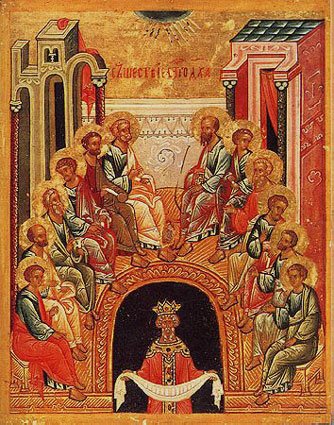



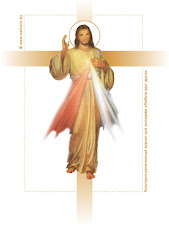











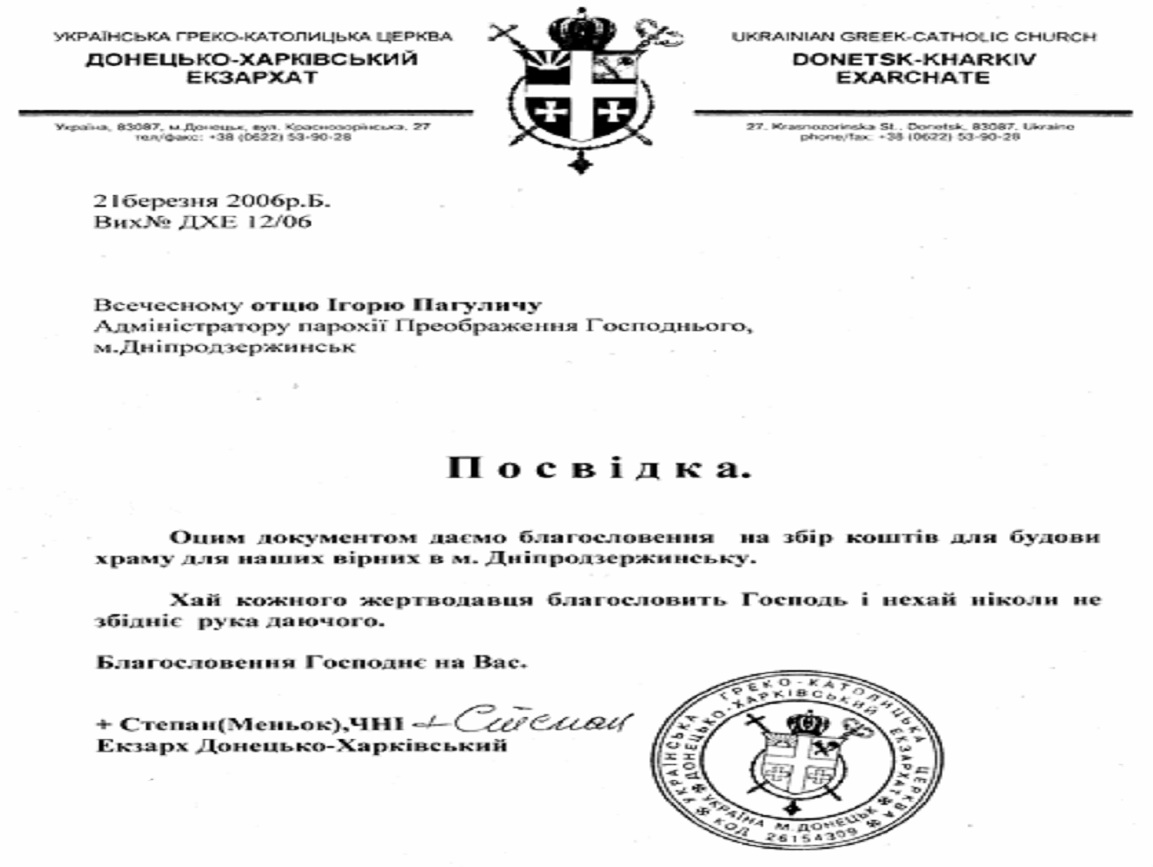
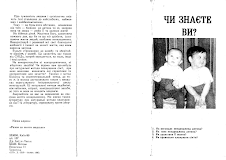

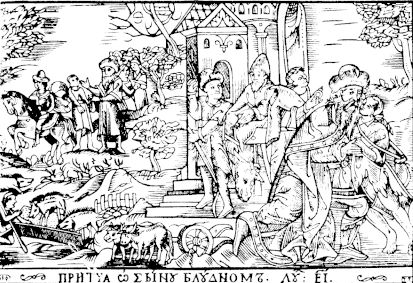
Немає коментарів:
Дописати коментар